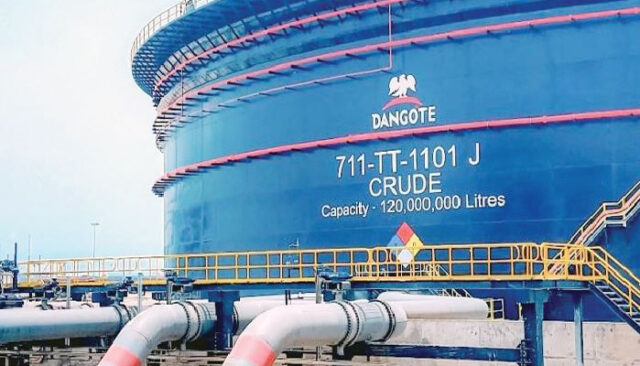Ghana could buy petroleum products from Nigeria’s Dangote Petroleum Refinery once the facility is operating at full capacity, cutting more expensive exports from Europe, the head of the country’s oil regulator said on Monday.
Chairman of the National Petroleum Authority, Ghana, Mustapha Abdul-Hamid, said this could end monthly fuel imports from Europe of $400m. He spoke at the OTL Africa Downstream oil conference in Lagos, Reuters reported.
The $20bn Lekki-based Dangote refinery commenced the release of Premium Motor Spirit, popularly called petrol, into the Nigerian market on September 15, 2024.
But despite this, marketers of the product in Nigeria have since commenced the importation of PMS in hundreds of millions of litres following the total deregulation of the downstream oil sector in Nigeria by the Federal Government.
However, at the function in Lagos on Monday, the Ghanaian petroleum authority official stated that his country might start importing fuel from the Nigerian refinery.
“If the refinery reaches 650,000 bpd a day capacity, all that volume cannot be consumed by Nigeria alone, so instead of us importing as we do right now from Rotterdam, it will be much easier for us to import from Nigeria and I believe that will bring down our prices,” Hamid said.
The Dangote refinery built by Nigerian billionaire Aliko Dangote is expected to operate at near full capacity at the end of the year and analysts believe it could be fully operational in the first quarter of 2025.
Hamid said importing from Nigeria rather than Europe would bring down the prices of other goods and services by removing freight costs. Eventually, he said African countries would agree on a common currency that should dampen demand for dollars.
Ghana’s economy, which grew by 6.9 per cent year-on-year in the second quarter of 2024, has been driven largely by a strong expansion of the extractive sector which has boosted demand for fuel.
Meanwhile, at the event in Lagos, the Chief Executive of the Nigerian Midstream and Downstream Petroleum Regulatory Authority, Farouk Ahmed, said the Dangote refinery will boost fuel supply once it is fully completed and licensed.
“Dangote Petroleum Refinery and Petrochemical Limited came on stream in February 2024 for the production of some petroleum products such as automotive gas oil, and aviation fuel.
“The refinery commenced production and supply of Premium Motor Spirit in September 2024. It is expected that supply from the factory will improve significantly when it is fully completed and licensed,” he said.
The multi-billion dollar plant has been supplying diesel and aviation fuel to both the domestic and international markets since it commenced operations in February.
The refinery halted Nigeria’s complete reliance on imported finished petroleum products that dragged for decades.
The country’s three refineries under the management of the Nigerian National Petroleum Company Limited have remained dormant for several years despite repeated efforts to revamp them.
Meanwhile, Ahmed urged stakeholders for a comprehensive domestic pricing framework for Liquefied Petroleum Gas to make the product more accessible and affordable for consumers nationwide.
He emphasised that in an attempt to make cooking gas affordable, the agency has been engaging stakeholders on domesticating LPG produced in countries by producers like Chevron Nigeria Ltd and Mobil Producing Nigeria Ltd, the Nigerian LNG and others.
“NMDPRA will engage stakeholders in the development of a domestic LPG pricing framework to make the product readily available and affordable for the consumers. With regards to alliances, we will continue our quarterly domain-specific engagements with key stakeholders and on-demand engagements with other relevant parties to address ongoing and emerging concerns,” he said.
Ahmed maintained that the Federal Government is deepening the liberalisation of the energy market through robust policies and provisions of generous incentives to address investment by both domestic and international companies.
He added that the gas sector holds 16 billion standard cubic feet per day licensed processing capacity, 5 billion standard cubic feet per day licensed transportation capacity, and about 1.5 billion standard cubic feet per day licensed distribution capacity.
“Nigeria is poised to actualise the targets of 2 million barrels per liquid oil production, the projected 10 billion standard cubic feet of gas target for domestic utilisation, and a robust domestic refining capacity, leading Nigeria to become a net exporter of petroleum products,” he said.







